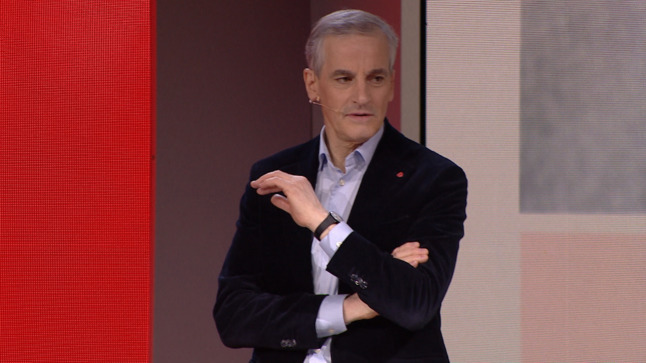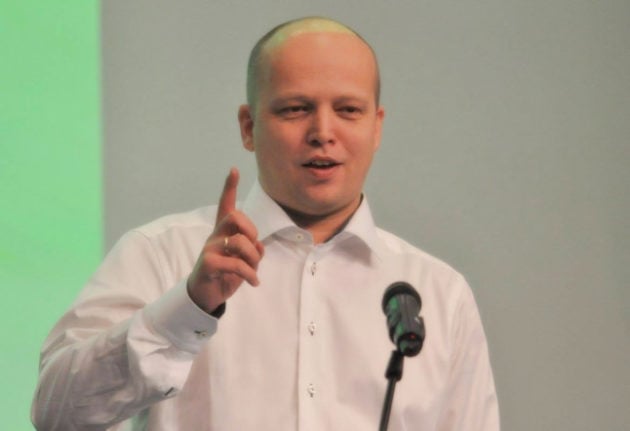The Left-wing Eurosceptic Parties could make big gains in Norway’s upcoming parliamentary election, in a fresh blow to Brussels.
Norwegians go to the polls tomorrow, September 13 will see a new government with a number of parties demanding the country reduce its ties with the EU. While Norway isn’t an EU member state, it is closely linked to the bloc via membership of the European Economic Area (EEA).
The Conservative Party Prime minister Erna Solberg is running for a third term, but it is unlikely that her coalition government will succeed. Oslo may get a Left-wing majority government bringing with it their opposition the country’s current European Economic Area agreement.
Labour leader Jonas Gahr Støre is the man tipped by the polls and commentators to take over the hot seat as prime minister forming a “red-green” coalition.
The most likely new government is a centre-left coalition of the Labour Party (Arbeiderpartiet), Centre Party (Senterpartiet) and Socialist Left Party (SV), which also held office in two terms between 2005 and 2013. However, the Centre Party wants a coalition with the Labour Party only, and the election campaign has revealed some bad blood between members of the former “red-green” alliance. The Centre Party as well as the Socialist Left Party are expected to make significant gains in the election. They are quite closely aligned in their scepticism towards EU and EEA policies.
Jonas Gahr Støre

Background: Having served as both foreign minister and health minister under Jens Stoltenberg’s government, Støre took over as Labour leader when Stoltenberg left to take over as NATO general secretary. Born in Oslo, Støre, who studied at the London School of Economics and Paris-Sorbonne University, is a fluent French speaker. He is married to sociologist Marit Slagsvold, with whom he has three children. Despite Labour being on course to deliver their worst election results since 1924, Støre is expected to take over as Norway’s next PM.
Party background: The party are on course to secure around 23 percent of the vote and will likely form either a majority or minority government with the Centre Party and the Socialist Left Party. A social democrat party in the classical Scandinavian mould, Labour has spent a large majority of the post-war years in government.
Trygve Slagsvold Vedum Party: Centre Party (SP – Senterpartiet
Centre Party leader Trygve Slagsvold Vedum recently hit out at “unaccountable bureaucrats in Brussels”.
He added: “The problem with the agreement we have today is that we gradually transfer more and more power from the Storting [Norwegian parliament], from Norwegian lawmakers to the bureaucrats in Brussels who are not accountable.”
Membership of the EEA gives Norway full access to the lucrative European single market.
However, it has to implement many laws made in Brussels, despite not being represented in the European Parliament or the European Council.
Critics argue this is a democratic deficit that infringes on Norwegian sovereignty.

Background: Trygve Slagsvold Vedum has been the party’s leader since 2014 and could be considered a parliamentary veteran at this point, having been an MP since 2005 and having already held the position of Minister Of Agriculture previously. He is said to be a keen dancer, but will he be busting moves come September 13th?
Party background: The party had set its sights on securing a parliamentary majority with just Labour for this election, but this dream appears to be dead and buried now. Instead, they will hope to secure a majority or minority government with Labour and the Socialist Left Party.
The Centre Party has its origins in the political movements started by farmers and fishers in the 1920s – its original name is Bondepartiet (The Farmers’ or Peasants’ Party). In its modern form, the party has an agrarian centrist outlook, supports private ownership and decentralisation and is against Norwegian EU membership.
A Eurosceptic coalition against the Conservatives.
Morten Harper gives us a broad picture of Norwegian Left Euroscptiisim writing for the Losa Luxemburg Stiftung Brusles office he states…
Since Norway rejected European Union (EU) membership in a 1994 referendum, eurosceptic sentiment has remained strong, with a majority against joining for the past 15 years. EU membership is not an issue ahead of the parliamentary election on 13 September. What is up for discussion is the agreement on the European Economic Area (EEA), making Norway part of the single market, and alternatives to this agreement.
There is growing concern about Norway’s subordinate relationship with the EU, and trade unionists are critical due to the liberalised market and free movement of underpaid labour. The parties critical of the EEA Agreement—the Red Party, Socialist Left Party and Centre Party—are expected to make significant gains in the election. There will still be a majority in parliament in favour of the EEA, but also a historically strong minority opposed to it. Furthermore, research by No to the EU indicates that there will be a clear majority that is open to rejecting controversial EEA legislation.
Norway’s “No” to the EU Is Mainly Centre-Left
Norwegians have twice rejected joining the European Union, in referendums held in 1972 and 1994. Eurosceptic sentiment has remained strong, so much so that in the past 15 years every single poll has found a majority opposed to joining. The most recent polling in June found 68 percent of Norwegians opposed to joining the EU (excluding the 8.8 percent who were undecided, source: Sentio).
Norway has in many ways thrived as an independent European nation, and on matters such as the environment, security and foreign aid is a global player punching far above its weight, given the country’s modest size. The Norwegian economy has enjoyed many years of growth stronger than the economies of EU Member States. There are of course a lot of challenges and areas for improvement in Norwegian society, but Norway scores highly in international rankings on a wide range of issues including gender equality, social welfare, even on happiness.
Polls indicate a majority in the electorate against EU membership across the political spectrum, from left to right. Some years ago, the right-wing Progress Party (Fremskrittspartiet) also took a stand against EU membership, and the only two parties in parliament clearly in favour of joining the EU are the Conservatives (Høyre) and the Liberals (Venstre). However, the gravitational force opposed to the EU is mainly centre-left, as it was in the referendums, as described by Dag Seierstad (2014) in his book on the movement’s history and also German scholar Carsten Schymik (2006). This is still evident in the ongoing campaigns and statements of the organisation No to the EU (Nei til EU).
Partners in Trade
Norway has historically, culturally and economically close ties to the United Kingdom. When the UK left the European Union, a substantial share of Norwegian exports to the EU also left the single market. In 2018, 77 percent of all Norwegian exports of goods went to the EU. In 2020, post-Brexit, the percentage dropped to 58.6. The UK is a major market for seafood and energy from Norway, as well as offshore services. What’s more, the UK-EU Trade and Cooperation Agreement is an interesting example of free trade without transfer of sovereignty to Brussels, and Norway (along with Iceland and Liechtenstein) has already negotiated a similar agreement with the UK.
Despite this, Prime Minister Erna Solberg et al. continue to embrace the same message: that Norway must have the EEA Agreement to sell goods to the EU. This argument has always been misleading. Norwegian industry had duty-free access on exports to the EU before the EEA—and this free trade agreement would still apply if the EEA Agreement was terminated.
Norwegian leftists are somewhat divided on Brexit. Some emphasise the right-wing elements of the UK campaign, and think this discredits the entire leave process. Others argue that as Brexit is now a reality, we should consider whether there are any new opportunities on how to handle trade and cooperation in Europe.
The main news outlets have focused on the difficulties of the Brexit process, arguing by implication that Norway is better off with the EEA. Brexit has so far not had any significant impact on the case for a Norwegian withdrawal from the EEA, but this could easily change as the dust settles and trade between the UK and EU returns to normal.
EU membership is not an issue in the election campaign—it is obvious that the next government will not be sending any application to Brussels. It is also pretty certain that Norway will not leave the EEA within the next four years. What is up for discussion, however, is an official research project, or Norwegian Official Report (NOU), on alternatives to the EEA Agreement. This is a demand put forward by leftist parties—the Red Party, Socialist Left Party and Centre Party—and also trade unions such as Fellesforbundet, the largest union organising the private sector. The Labour Party does not want an NOU, but has not closed the door entirely. This will be a hot potato after the election if there is – as expected – a majority for a new government.
Controversy Over Energy and Public Railways

Norway and EFTA partners Iceland and Liechtenstein have the legal right to reject new EU legislation before it is written into the EEA Agreement. A key issue now is whether Norway should implement the EU’s Fourth Energy Package on clean energy. The Red Party, Socialist Left Party and Centre Party wish to reject all or most of the package. These parties also want to withdraw Norway from the EU energy regulator ACER, because they find the transfer of sovereignty to be too far-reaching. The Labour Party voted in favour of joining ACER, but was split down the middle, and has not yet taken a position on the Fourth Energy Package.
Norway is a major producer of energy. The European Commission wants to link Norway as closely as possible to the EU Energy Union. Hardly anything matters more to the backbone of Norwegian industry than long-term access to electric power at competitive prices. New and planned cables for exporting electricity to the continent and the UK are resulting in Norway importing higher electricity prices the other way. This is perceived as a threat to the industry providing jobs across the country. The parties opposing ACER argue that renewable hydroelectricity is needed in Norway to transform and reduce emissions from industry, and to phase out fossil fuels in the transport sector.
Another major EEA issue is the EU’s Fourth Railway Package, which makes tenders on rail transport—currently state-owned and state-run—compulsory, in addition to transferring authority concerning access and safety on Norwegian railways to the EU Agency for Railways (ERA). In this case, the Red Party, Socialist Left Party, Centre Party and Labour Party all wish to reject the package, as they want the railway to be in public hands. The Greens are also opposed to the EU regulations, fearing that compulsory liberalisation will make it more difficult to improve and expand rail transport.
The parties critical of the EEA Agreement—Red, Socialist Left and Centre—are set to gain many new seats in parliament. There will still be a majority in favour of the EEA, but also a historically strong minority opposed to it. Furthermore, research by No to the EU indicates that there will be a clear majority that is open to rejecting controversial EEA legislation (Nei til EU 2021).
The election on 13 September is shaping up to be the beginning of a more critical approach by Norway towards EU market laws and also the EEA as such.
About Morten Harper (b. 1973) is research manager of No to the EU (Nei til EU), Norway’s main organisation working against membership of the European Union, and a member of the EU/EEA committee of the Socialist Left Party (SV).
Support Independent Journalism Today
Our unwavering dedication is to provide you with unbiased news, diverse perspectives, and insightful opinions. We're on a mission to ensure that those in positions of power are held accountable for their actions, but we can't do it alone. Labour Heartlands is primarily funded by me, Paul Knaggs, and by the generous contributions of readers like you. Your donations keep us going and help us uphold the principles of independent journalism. Join us in our quest for truth, transparency, and accountability – donate today and be a part of our mission!
Like everyone else, we're facing challenges, and we need your help to stay online and continue providing crucial journalism. Every contribution, no matter how small, goes a long way in helping us thrive. By becoming one of our donors, you become a vital part of our mission to uncover the truth and uphold the values of democracy.
While we maintain our independence from political affiliations, we stand united against corruption, injustice, and the erosion of free speech, truth, and democracy. We believe in the power of accurate information in a democracy, and we consider facts non-negotiable.
Your support, no matter the amount, can make a significant impact. Together, we can make a difference and continue our journey toward a more informed and just society.
Thank you for supporting Labour Heartlands












